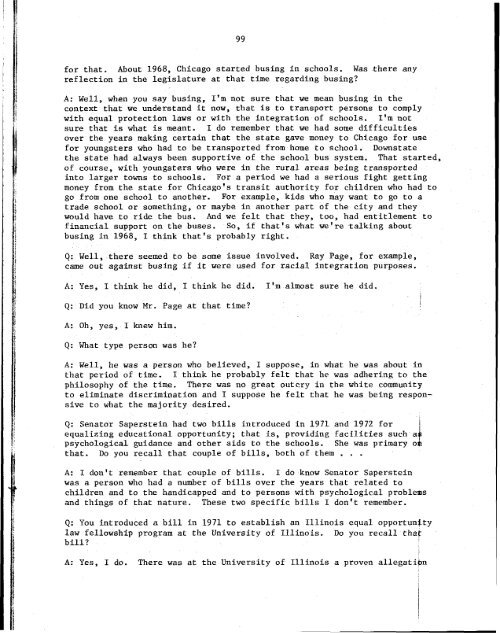Cecil A. Partee Memoir - University of Illinois Springfield
Cecil A. Partee Memoir - University of Illinois Springfield
Cecil A. Partee Memoir - University of Illinois Springfield
Create successful ePaper yourself
Turn your PDF publications into a flip-book with our unique Google optimized e-Paper software.
for that. About 1968, Chicago started busing in schools. Was there any<br />
reflection in the legislature at that time regarding busing?<br />
A: Well, when you say busing, I'm not sure that we mean busing in the<br />
context that we understand it now, that is to transport persons to comply<br />
with equal protection laws or with the integration <strong>of</strong> schaols. I'm not<br />
sure that is what is meant. I do remember that we had some difficulties<br />
over the years making certain that the state gave money to Chicago for use<br />
for youngsters who had to be transported from home to school. Downstate<br />
the state had always been supportive <strong>of</strong> the school bus system, That started,<br />
<strong>of</strong> course, with youngsters who were in the rural areas being transported<br />
into larger towns to schools. For a period we had a serious fight getting<br />
money from the state for Chicago's transit authority for children who had to<br />
go from one school to another. For example, kids who may want to go to a<br />
trade school or something, or maybe in another part <strong>of</strong> the city and they<br />
would have to ride the bus, And we felt that they, too, had entitlement to<br />
financial support on the buses. So, if that's what we're talking about<br />
busing in 1968, I think that's probably right.<br />
Q: Well, there seemed to be some issue involved, Ray Page, for example,<br />
came out against busing if it were used for racial integration purposes.<br />
A: Yes, 1 think he did, I think he did. I'm almost sure he did.<br />
Q: Did you know Mr. Page at that time?<br />
i<br />
1<br />
A: Oh, yes, I knew him.<br />
Q: What type person was he?<br />
A: Well, he was a person who believed, I suppose, in what he was about in<br />
that period <strong>of</strong> time, I think he probably felt that he was adhering to the<br />
philosophy <strong>of</strong> the time. There was na great outcry in the white community<br />
to eliminate discrimination and I suppose he felt that he was being responsive<br />
to what the majority desired.<br />
Q: Senator Saperstein had two bills introduced in 1971 and 1972 for<br />
equalizing educational opportunity; that is, providing facilities such a<br />
psychological guidance and other aids to the schools. She was primary o<br />
that. Do you recall that couple <strong>of</strong> bills, both <strong>of</strong> them . , .<br />
I<br />
A: I don't remember that couple <strong>of</strong> bills. I do know Senator Saperstein<br />
was a person who had a number <strong>of</strong> bills over the years that related to<br />
children and ta the handicapped and to persons with psychological problems<br />
and things <strong>of</strong> that nature. These two specific bills I don't remember.<br />
Q: Yau introduced a bill in 1971 to establish an <strong>Illinois</strong> equal opportunfty<br />
law fellowship program at the <strong>University</strong> <strong>of</strong> <strong>Illinois</strong>. Do you recall thap<br />
bill?<br />
I<br />
A: Yes, 1 do. There was at the <strong>University</strong> <strong>of</strong> <strong>Illinois</strong> a proven allegatibn
















